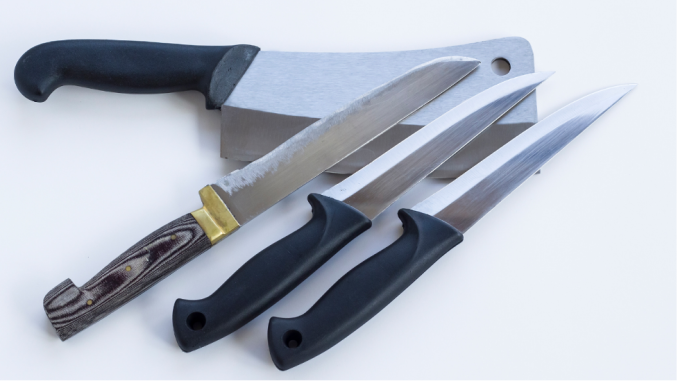
When shopping for new kitchen knives, you’ll often see terms like „hand-forged“ and „factory-made.“ But what do these labels actually mean, and how do the knives compare in terms of quality and performance?
Keep reading to learn the key differences between hand-forged and factory-made blades.
What Does Hand-Forged Mean?
A hand-forged knife starts out as a single piece of steel. A blacksmith heats up the steel to very high temperatures in a forge or furnace to make it soft and easy to shape. Next, the blacksmith uses a hammer to pound the red-hot steel into the basic shape of a knife blade.
Aligning the grain makes a blade stronger and better able to hold a super sharp edge. And once the shape is right, the blacksmith grinds, files, polishes, and hones the new blade until it has a flawless finish. The entire process is done by hand without any machines or computers involved.
What About Factory-Made Blades?
In contrast to traditional hand-forging, factory knife-making relies heavily on high-tech machinery. Robotic arms, hydraulic presses, laser cutters, and other automated equipment take the place of the blacksmith’s hammer.
This automation allows companies to churn out far more knives in less time compared to hand-forging. Modern heat treatment techniques also give the steel very consistent properties. So while you lose some handmade craftsmanship with factory knives, you gain better efficiency and standardization.
Hand-Forged Knife Benefits
Hand-forging has some inherent qualities that many knife enthusiasts prize. Here are some of top the benefits of hand-forged chef’s knives and other kitchen cutlery.
Unique Character
No two hand-forged blades will ever come out exactly the same. The many hundreds of hammer strikes will cause small variations in shape and finish. These „imperfections“ give hand-forged knives a one-of-a-kind character that many people find appealing.
Your hand-forged knife will be uniquely yours, like a signature piece of jewelry or a special painting. And some blacksmiths intentionally alter certain aesthetic elements to make their blades recognizable.
Superior Balance
Careful hand-forging allows a blacksmith to perfectly balance a blade based on its specific size and shape. This fine-tuned balance makes a hand-forged knife feel exceptionally agile and smooth in your hand.
In comparison, factory knife-making prioritizes quantity over balance crafting. So machine-made knives often have only passable weighting rather than the impeccable balance of their hand-made counterparts.
Sharpens Better
The grain alignment that happens during hand-forging improves a blade’s ability to take and hold a very fine, acute edge – meaning it gets incredibly sharp. Some knife enthusiasts claim hand-forged blades sharpen to a superior degree than factory-made knives.
And even as the razor edge inevitably dulls from use, the optimized grain allows for easier re-sharpening back to peak slicing capability again and again.
Improved Durability
The compressed grain structure of a hand-forged blade also bolsters its endurance and resilience. Quality hand-forged knives tend to retain their edge sharpness incredibly well even under heavy use. They typically need less frequent sharpening compared to factory-made knives constructed the same way.
The sturdy build and fine edges also allow hand-forged blades to better handle heavy chopping tasks. With proper care they can even last for generations – in some cases becoming family heirlooms.
Artisanal Craftsmanship
Perhaps most importantly, traditional hand-forging exemplifies the pinnacle of artisanal craftsmanship. An experienced blacksmith blends technical skill, creativity, and even intuition when forging a blade. This mastery and personal attention to detail is inherently part of the appeal for enthusiasts.
And in a world dominated by mass manufacturing, handmade goods like custom knives represent preserving traditional crafts and human artistry against technology’s march. This sense of intimate craftsmanship gets passed along to the owner as well, making a hand-forged knife feel special.
Factory Knife Benefits
Hand-forging may celebrate age-old techniques, but factory knives boast some key advantages too thanks to precision machinery. Let’s examine the biggest benefits of these machine-made blades.
Uniformity
Modern heat treatment and machining ensure very consistent material and build properties. You can expect every knife to have nearly identical performance. No need to worry about quirks or lemons as can occasionally happen even with top blacksmiths.
Predictable design also aids maintenance. You’ll sharpen and care for factory knives the same safe way every time rather than handling the unique eccentricities common amongst hand-crafted things.
Lower Costs
By nature, hand-forging takes vastly more time and personal skill compared to automated knife-making. And hand-forging has a far lower volume output. These factors drive up prices for hand-forged knives – often drastically.
In contrast, factory knife companies Sakuto can crank out huge numbers of blades every day. And the efficiencies of mass production coupled with cheaper base materials keep per-knife costs down even with high-quality construction.
You can easily find outstanding factory-made chef’s knives for everyday home kitchen use at very wallet-friendly prices. Special hand-forged knives occupy a luxury niche by comparison.
Innovative Materials
Factory manufacturing allows companies to work with new alloys and composites that may be too expensive or tricky for the tiny scale of hand-forging shops. Powdered steel, ceramic composites, laminates with multiple layers of material, and more all come from factory knife tinkering.
And factories eagerly adopt advanced heat treatment techniques to push steel properties even further. Cutting-edge styles and performance advance faster thanks to factory R&D budgets – although sometimes at the cost of tradition.
High-Volume Production
Far more customers can enjoy excellent quality knives when factories automate. It allows companies to keep up with huge market demands in a way that hand-crafting never could. And thanks to this, excellent blades shift from specialty items only some can own into widely accessible essentials for every kitchen thanks to scalable manufacturing.
Hand-Forged vs Factory: Head to Head
Now that we’ve covered the general traits and advantages of hand-forged and factory knives, let’s directly compare some key characteristics head to head across these two categories.
Sharpness
Both construction methods allow extremely sharp edges when done right – arguably sharper than necessary for kitchen use. Hand-forging perhaps has an incremental lead when the knife is made by master blacksmiths, but factory sharpening has fewer weak links and more consistency from batch to batch.
Edge Retention
The compressed grain of hand-forged blades likely bests factory knives over time. But again, performance gaps are reduced thanks to exacting automation. Either will stay sharp for months with typical home kitchen cutting duty.
Durability
The two last well with normal kitchen tasks. But hand-forging’s pedigree under battle-tested conditions gives it an ancestral edge for demanding jobs. Thinner flexible factory knife blades can prove more fragile if abused.
Balance & Handling
Hand-forging places balance crafting as a priority, probably to a level that factory production doesn’t bother with. This finesse leads to a nicer in-hand feel. But factory QC keeps tolerances tight enough for most users.
Appearance
Hand-forged celebrates charming imperfections and eye-catching artistic touches that factory production avoids by design. Factory focus stays on utility. So hand-forged brings more visual panache.
Price
Hand-forged commands eye-watering premiums out of necessity. Factory models sell for everyday budgets despite high build quality thanks to their volume efficiency. Hand-forged blades sit firmly as luxury goods only.
Availability
It is far easier to purchase factory knives anytime online or locally. Hand-forged kitchen knife availability remains constrained by low volumes and reliance on limited specialty shops. As a result, factories dominate shelf space.
So in nearly all regards besides romanticized craftsmanship, high-end factory knives prove just as good if not subtly better for most tasks than dedicated hand-forged cutlery. And factories hold far greater convenience advantages for purchase and ownership.






